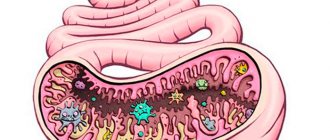Types of diarrhea, what types of diarrhea are there?
Stool disorders that make stool loose have different origins. The infectious component of diarrhea lies in infections of the body with salmonellosis, dysentery, amoebiasis, various poisonings, and viral diseases. Diarrhea due to drug-induced indigestion is associated with side effects of antibiotics. Medicines of this type are aggressive to all microorganisms in the intestine, therefore they have a detrimental effect on its microflora, provoking the appearance of dysbacteriosis. Alimentary diarrhea is a consequence of poor nutrition, vitamin deficiency, and allergic reactions of the body to certain foods or medications.
Toxic diarrhea occurs as a result of kidney failure due to arsenic or mercury poisoning. Dyspeptic diarrhea is caused by minimal secretion of gastric secretions. This situation occurs due to disturbances in the functioning of the small intestine, liver or pancreas. Nervous bowel dysfunction can appear after severe stress, fear or other disruptions in the functioning of the nervous system. In this case, intestinal motility is disrupted at the level of processes in the brain.
Frequent bowel movements, but not diarrhea in an adult: causes and treatment
The nervous system affects the functioning of various organs. Psychological difficulties can lead to disruption of the digestion process. Frequent bowel movements in an adult are not always a sign of diarrhea. Various diseases of the gastrointestinal tract can provoke pathology.
Causes of frequent bowel movements
What determines the frequency of bowel movements? There are several factors that force a person to visit the toilet more than 2 times a day:
- Many people's bodies produce few digestive enzymes. This is due to disruption of the pancreas. Food simply does not have time to be completely digested in the digestive system. Incompletely digested food fragments quickly enter the intestines.
- Frequent bowel movements in an adult can be associated with diseases such as colitis, gastritis and pancreatitis. The patient suffers from a feeling of heaviness in the abdomen and flatulence. Malfunctions of the digestive system force a person to visit the restroom multiple times.
- The most difficult thing to identify in a patient is irritable bowel syndrome. The patient's stool does not become liquid. Therefore, the pathology cannot be called diarrhea. However, a person experiences dyspeptic symptoms. The desire to empty the intestines occurs in a person immediately after eating.
- The cause of the deviation may be an incorrect diet. Pay attention to what you eat. Patients who eat too many vegetables and fruits suffer from frequent bowel movements. This reaction is not surprising, since they contain a lot of fiber. Too much plant fiber causes the intestines to work overtime. This is especially true for people who eat exclusively plant foods.
How to eliminate psychological problems of the disease
The state of the nervous system affects the functioning of the digestive organs. People prone to increased anxiety suffer from frequent bowel movements. They adapt poorly to new conditions and get irritated over trifles.
Frequent bowel movements indicate that a person is experiencing the following emotions:
- The patient is very irritated and constantly nervous.
- The patient experiences emotional instability and a feeling of fear.
- The patient suffers from symptoms of schizophrenia.
- If a person cannot solve the difficulties that have befallen him, then the process of digesting food is disrupted.
- People with an unstable nervous system perceive personal failures quite painfully. Suspicious people begin to suspect that their health is not all right. In this case, you need to contact a psychologist who will help you find a way out of this situation.
To calm an overexcited nervous system and diarrhea due to nervousness, you can use antidepressants. In combination with psychotherapy, treatment can achieve stable results. The functioning of the digestive organs should gradually normalize.
What is the danger of frequent bowel movements?
Too frequent bowel movements deprive the patient of essential vitamins and microelements. A lack of digestive enzymes leads to incompletely digested food entering the large intestine. The patient may develop vitamin deficiency and anemia.
What should you not eat if you have frequent bowel movements?
The cause of frequent bowel movements may be poor nutrition. In this case, treatment must begin with an analysis of the patient’s daily diet.
Products that stimulate bowel function include:
- Frequent bowel movements are provoked by dishes that contain a lot of fructose.
- Drinking milk causes frequent bowel movements.
- Artificial sugar substitutes are the most common food additive. Many people don’t even think about the harm that they can cause if eaten regularly.
To get rid of the symptoms of indigestion, you need to completely review your menu. During illness, exclude fried foods from your diet.
Smoked meats are prohibited, as they irritate the intestinal walls.
Eating too hot food does not have the best effect on the functioning of the digestive system. The daily amount of food must be reduced.
Foods that can help relieve indigestion
Are you tormented by the desire to go to the toilet at the most inopportune moment? You can eliminate unpleasant symptoms with diet. Be sure to include the following types of foods in your diet:
- Rusks will help you reduce the frequency of bowel movements.
- Healthy dishes include meat or vegetable broth.
- It is allowed to eat lean meat. It must be boiled or steamed.
- Visits to the restroom will become less frequent if you include boiled eggs in your diet.
- You can improve the functioning of your digestive organs using natural jelly. You should not use purchased briquettes, to which manufacturers generously add flavorings and dyes.
- Black tea has a healing effect for frequent bowel movements.
- Healthy foods include low-fat cottage cheese and fish.
How to eliminate digestive enzyme deficiency
Lack of enzymes is one of the reasons for frequent bowel movements. To treat patients with pancreatitis, drugs such as Festal and Mezim Forte are used.
Follow the dosage indicated in the instructions. The duration of treatment depends on the patient's condition. Typically, the course of taking medications takes from 4 to 12 days.
How to restore the functioning of the digestive organs with colitis
Frequent bowel movements can be caused by colitis. Doctors prescribe antibacterial agents (Polymyxin, Terramycin). They suppress the activity of pathogenic microorganisms that actively multiply in the intestines. The dosage depends on the patient's condition.
Treatment of dysbiosis
Taking antibiotics leads to disruption of intestinal microflora. Not having enough beneficial bacteria causes frequent bowel movements.
To restore microflora, doctors prescribe probiotics to patients (Lactofiltrum, Bifidumbacterin). With regular use of the drugs, the patient's stool normalizes and gas formation decreases.
Treatment of frequent bowel movements due to gastritis
In the body of a patient with gastritis, the production of gastric juice is disrupted. Patients complain of pain in the stomach area. Gastritis complicates the process of digesting food. A deficiency of gastric juice leads to stagnation of food.
As a result, fermentation begins and belching occurs. Chronic gastritis often causes intestinal dysfunction. The patient suffers from flatulence, as food enters the intestines in an insufficiently digested form.
The factor that provokes the occurrence of gastritis is considered to be Helicobacter pylori infection. To destroy the bacteria, the doctor prescribes antibiotics. However, this is not the only cause of this disease. Ulcers and erosions in the stomach can provoke the development of gastritis.
How to eliminate irritable bowel syndrome
Irritable bowel syndrome
The choice of means depends on the individual characteristics of the person. Often this condition develops against the background of nervous tension. Such patients are recommended to take antidepressants. Exercise helps relieve stress. Be sure to make an appointment with a psychologist.
To reduce intestinal spasms, you can use antispasmodics (Papaverine, Drotaverine). To regulate intestinal motility, doctors prescribe prokinetics (Trimedat, Alosetron).
Source: https://healthyorgans.ru/zheludok/lechenie-zheludka/9075-chastyj-stul-no-ne-ponos-u-vzroslogo-prichiny-i-lechenie
Symptoms of diarrhea, what signs of diarrhea could there be?
The frequency of the urge to defecate during diarrhea depends on many factors and even in the same person may vary in different cases. The same applies to the consistency of stool, varying from watery to mushy. Its characteristics are formed depending on the cause of diarrhea. For example, with dysentery, the patient’s stool is initially dense and only after some time it becomes liquid with visible inclusions of blood and mucus.
One of the most common signs of loose stools is pain in various parts of the abdominal cavity. Diarrhea that does not last long - up to a day - may not pose a threat to human health. However, if the illness persists, it is necessary to immediately seek help from a doctor. Prolonged diarrhea can cause asthenia and the rapid elimination of vitamins and microelements necessary for the smooth functioning of the body, causing malfunctions in the functioning of internal organs. Therefore, to prevent complications, you should not self-medicate with diarrhea. The diagnosis and determination of treatment methods should be entrusted to a qualified specialist.
Causes frequent bowel movements but not diarrhea
- 1 Reasons for frequent bowel movements, but no diarrhea, why constantly go to the toilet
- 2 How dangerous is frequent bowel movements, what does this mean?
- 3 Psychological problems as causes of frequent bowel movements
- 4 Diet, what should you eat to strengthen your stool, what should you not eat if you have frequent bowel movements? 4.1 Recommended menu if a person often goes to the toilet for a long time
Each person has an individual bowel movement regimen, depending on the amount of food consumed, the state of the gastrointestinal tract, age, and other factors.
When the usual frequency of stool changes, many people mistakenly believe that diarrhea has appeared, but this is not entirely true. With diarrhea, feces are not only released more frequently, but also have a watery consistency. Therefore, frequent bowel movements are not considered as an unambiguous sign of a pathological condition of the body. But it is still necessary to clarify the reasons for its appearance, since this may only be the first signal indicating malfunctions in the gastrointestinal tract, which in the future may result in the development of serious diseases of the digestive system. The article discusses the symptoms if you constantly want to go to the toilet, by and large, what they can mean and what they indicate. articles:
Frequent stools, but not diarrhea in a child or adult, can indicate completely different reasons, ranging from physiological (non-dangerous causes of frequent, but not loose stools) to pathological (diseases and illnesses).
How often should a person walk around normally, how many times a day should he poop for this to be the norm? The frequency of bowel movements for a healthy person should be within 1 time a day, 2 days and ending with 2 times a day.
If a person goes to the toilet less than once every 2 days, then this can already be considered symptoms of constipation and diarrhea. If a person goes to the toilet more than 2 times a day, generally 3, 4, 5 times, then this can already be considered symptoms of a deviation from the norm.
It is noteworthy that even if a person poops 3, 4, 5, 6 times in 1 day, and the stool is not liquid, this cannot be considered symptoms of diarrhea or signs of the development of diarrhea.
Frequent stools, if a person went to the toilet more than 3, 4, 5 times in 1 day, but after that the stool and its frequency returned to normal, is not considered a pathology or dangerous cause, most likely there was a violation of the diet or poor quality products., others physiological reasons. Further in the article, we will go into detail about what may be the reasons for frequent bowel movements, which can affect the frequency of bowel movements when there is no diarrhea, but you often want to go to the toilet.
Reasons for frequent bowel movements, but no diarrhea, why constantly go to the toilet
What determines the frequency of bowel movements in a child and an adult, which can influence how often you go to the toilet in general.
When changing the frequency of bowel movements, you need to pay attention to the seasonality of this phenomenon, since in the summer many people switch to a fruit and vegetable diet rich in fiber, which can provoke an increase in bowel movements.
If a similar phenomenon is observed regardless of the time of year, it is worth remembering whether problems began in connection with the transition to some special diet.
For example, patients who have changed their usual diet and switched to a raw food diet and vegetarianism note an increase in the number of daily bowel movements, but do not complain of diarrhea. This happens because the intake of a significant amount of plant fibers into the body with food stimulates intestinal motility and accelerates the movement of intestinal contents through the digestive tract.
If the change in stool frequency is not one-time, but regular, it is worth checking the functioning of the digestive organs. To do this, you need to take tests and be examined by a gastroenterologist. The reasons for the increased frequency of defecation may lie in disturbances in the functioning of the gastrointestinal tract, manifested by pathology. Frequent bowel movements in the morning, afternoon or evening in an adult can be caused by diseases such as:
Frequent bowel movements are accompanied by a number of painful signs, including: a feeling of heaviness in the stomach, a feeling of constant transfusion, and distension in the intestines.
When the stomach growls, a false urge to defecate often appears, forcing the patient to stay closer to the toilet all the time. Because of this, nervous tension increases, which can further aggravate the situation.
If the patient’s feces consistency does not change during bowel movements, but a number of dyspeptic manifestations increase (belching, heartburn, attacks of nausea, epigastric discomfort), the reasons should be looked for:
1 if you often want to go to the toilet during the day, then the reason may be functional disorders of the gastrointestinal tract;
2 if you went to the toilet for a long time, and after a while you wanted to again and this happens several times, the problem may be insufficient secretion of enzymes necessary for digestion;
3 if there is a feeling that you still want to poop as soon as you went to the toilet for the most part, the reason may be the consequences of nervous tension, stress, psychological problems;
4 if you often want to go to the toilet but have nothing with which to go, if a person cannot go, but the feeling of wanting to go to the toilet remains, there may be problems with the movement of feces through the intestines.
With irritable bowel syndrome, the urge to have a bowel movement appears almost immediately after eating. In case of lack of secretion of digestive enzymes, produced mainly by the pancreas, part of the food mass is not fully digested and leaves the intestinal lumen in an accelerated manner.
Due to nervous experiences and shocks, frequent stress, people often complain of an increased frequency of bowel movements, but without diarrhea. This is explained by increased innervation of autonomic nerve endings in the intestinal walls due to the reaction of the central nervous system in a situation of nervous overstrain.
How dangerous is frequent bowel movements? What does this mean?
Frequent bowel movements in themselves are not dangerous, but with more frequent bowel movements:
1 a significant portion of nutrients, microelements and vitamins are removed from the body along with fecal matter;
2 the intestines are subjected to excessive stress due to being filled with unprocessed food residues due to the lack of sufficient secretion of enzymes;
3 loss of vitamins and minerals leads to the development of vitamin deficiency and increasing anemia;
4 when there is a deficiency of a sufficient volume of bile acids, feces acquire an oily consistency, since the fatty components of food do not undergo complete breakdown;
5, the anal sphincter muscle functions under increased load, its tone may gradually weaken, and the epithelium of the anus is constantly injured by feces, which can lead to bleeding.
6 The feeling of weakness and general malaise increases.
Particular attention should be paid to symptoms if a person has very frequent bowel movements in the morning, afternoon or evening, at night and there is pain in the abdomen or intestines. The desire to frequently run to the toilet can be accompanied by severe pain in the lower abdomen on the left or right, in the groin and genital area, or near the waist (for intestinal problems).
You should also pay attention to what kind of feces are passed out during very frequent stools. If there are inclusions or streaks of mucus in the stool (white, transparent, yellow or green mucus), there is blood (scarlet, black blood or bloody inclusions), pus, all these are very dangerous symptoms of various kinds of pathologies.
Stool should be light brown in color ideally, but the color of stool depends greatly on a person's diet. If the stool is light yellow or dark yellow all the time, or if the stool is often green or yellowish, then most likely there is a lot of bile in the stool.
Very light or almost white frequent stools may appear due to liver problems.
Psychological problems as causes of frequent bowel movements
Sometimes suspicious people are faced with the question of why, when I’m worried, I really want to go to the toilet. The instability of the patient's psycho-emotional mood has a negative impact on the functionality of the digestive system. Frequent bowel movements occur in patients with a low stress tolerance threshold.
Anxiety, excessive vigilance, and increased irritability cause disruptions in the digestive processes, since they are completely controlled by the central nervous system.
And her unstable condition due to the patient’s overexcitement and suspiciousness negatively affects the reaction of the nerve endings with which the gastrointestinal tract is saturated.
Due to personal experiences and stress against the background of more frequent bowel movements, the patient inadequately assesses the state of his health, “inventing” illnesses for himself, which further aggravates the situation. Such cases often lead to the appearance of diarrhea due to nervousness, diarrhea due to stress, prolonged emotional experience, and nervous overstrain.
In more uncomplicated cases, diarrhea due to nerves can turn into just frequent stools, frequent bowel movements, up to almost complete cleansing of the intestines. Why do you get diarrhea when you're nervous? This is how the body reacts to a stressful environment.
The body tries to free up its resources for a stressful situation and releases the intestines so as not to waste its energy on digestion.
What to do if diarrhea appears due to nervousness, what to do if you often want to go to the toilet because of psychological overstimulation? In such cases, the help of a psychologist or psychotherapist is indispensable.
A few sessions of psychotherapy and a course of antidepressants selected by a doctor are enough to eliminate overexcitation of the central nervous system, reduce excessive levels of emotions and stabilize the psycho-emotional mood.
Following this, digestive functions should normalize, and stool frequency should return to its usual rhythm.
Source: https://ParazitHelp.ru/parazity/chastyj-stul-prichiny-no-ne-diareja.html
Diagnosis of diarrhea, how to identify the cause of diarrhea?
To identify the cause of diarrhea in a teenage patient, the doctor first of all prescribes an examination. It is necessary for correct diagnosis and selection of the optimal treatment method. Such situations require differential diagnosis aimed at identifying the microbial infection that has become the source of intestinal malfunction. Based on the patient’s complaints received before the test results, the doctor makes a prediction of the probable cause of the disease, which provokes the appearance of symptoms in the form of diarrhea. An objective visual assessment of stool and the collected medical history are very important in the initial summary of the patient’s condition.
Diarrhea and vomiting in a teenager, causes of diarrhea, nausea and vomiting in children during adolescence
The first reason why adolescents develop nausea and vomiting, as well as diarrhea and asthenia, is considered to be food consumed by the patient shortly before the onset of uncomfortable symptoms. Thus, nausea is often provoked by excessively fatty foods. If the patient's condition is aggravated by diarrhea, there is a high probability of a bacterial infection in the intestines or an exacerbation of chronic diseases of the digestive system. The above ailments may not be related to serious illnesses. Thus, many girls during puberty strive to achieve ideal body parameters using various diets that cause more harm to the gastrointestinal tract than good. A strict diet can cause not only temporary nausea, diarrhea or vomiting, but also lead to dysbiosis.
Loose stools and diarrhea that do not stop for several days are a sign of inflammation in the intestines. In a healthy person, the urge to defecate occurs no more than three times a day; when going to the toilet, the consistency of stool is average. Diarrhea with vomiting is often accompanied by pain in the stomach and migraine. Vomiting with diarrhea, which is repeated several times in a short period of time, raises suspicions about the occurrence of serious diseases. If there are blood inclusions in the stool during diarrhea, you should immediately seek help from a medical facility. The described symptoms with increased body temperature and obvious asthenia indicate the presence of infections in the intestines.
Sudden stomach rejection of food and diarrhea most likely indicate food poisoning. In this case, the patient needs to rinse the stomach and give activated charcoal (1 tablet per 10 kg of body weight). Viral hepatitis is indicated by discolored diarrhea with vomiting; the patient’s urine also darkens and the body temperature rises. If you experience signs of infectious intestinal diseases or viral hepatitis, you should immediately go to the hospital.
If a teenager feels sick and vomits, experiences diarrhea and periodic pain in the stomach, there is a bitter taste in the mouth, sour belching appears, there is a high probability of gastritis, stomach or intestinal ulcers, hepatitis, cholecystitis, and chronic pancreatitis. The unpleasant signs of these diseases can only be eliminated if their source is treated. Inflammation is caused by the poor quality of food and water regularly consumed by adolescents. Therefore, from an early age, a child should be taught to eat only high-quality food.
Causes of loose and frequent stools
Everyone is at risk of developing chronic loose stools. Frequent bowel movements without diarrhea can be caused by:
- Disturbance in the functioning of the gastrointestinal tract. Multiple urges to empty the bowels, flatulence, and a feeling of heaviness in the abdomen torment patients with pancreatitis, cholecystitis, gastritis, and colitis.
- Enzyme deficiency. Most adults experience insufficient production of digestive enzymes; some foods are not digested and come out in pieces. The disorder is caused by pathology of the pancreas.
- Wrong diet. Scientists and doctors urge people to pay attention to food. Changes in eating habits, increasing the consumption of fiber, dietary fiber, and avoiding meat can cause stool thinning.
- Irritable bowel syndrome. A difficult disease to diagnose. Problems begin immediately after eating; sometimes the patient is unable to finish the meal due to the appearance of urges. The difference is that stool can change from liquid to mushy.
- Psychological reasons. The nervous system affects the functioning of the body and the digestive system. In an adult, the disorder can begin against the background of emotional tension, anxiety, and stress. Treatment should be provided by a psychotherapist.
- Alcohol consumption.
- Colon cancer. The disease is dangerous and affects the cells of the mucous membrane of the large intestine. Often the only cause is bloody diarrhea or constipation.
- Gluten intolerance. Associated with malabsorption of foods containing gluten. The danger lies in the fact that gradual damage to the mucous membrane occurs; during defecation, loose, pale-looking feces with various impurities and an unpleasant, pungent odor are released.
- Hyperthyroidism. The thyroid gland produces excess amounts of hormones, which speeds up metabolism. Increases the frequency of trips to the toilet, causes weight loss with increased appetite.
- Taking medications. Many medications have diarrhea as a side effect.
- Pregnancy. During this period, frequent bowel movements are a physiological feature. Most often observed at the end of the third trimester. The body cleanses itself in preparation for the birth process. Drug treatment is not necessary.
- Pathologies of the liver and gall bladder in an adult. A large amount of bile enters the rectum, which causes liquefaction of the stool. Signs: pain in the right hypochondrium, yellow-green color of stool.
- Chondrosis. Pressure on nerve roots and pressure on internal organs can cause a reaction - constipation or diarrhea.
- Kidney failure. Increased frequency of urges is observed in the last stages of uremia. The masses are dark in color and have a specific smell. Inflamed kidneys cause fever and vomiting.
All described conditions require medical examination.
Diseases and various disorders can occur in adolescents, older people, and adults. Pensioners are at risk due to decreased physical activity and age-related changes in the body.
It is necessary to correctly identify the causes of frequent bowel movements and eliminate them.
Treatment of diarrhea, frequent loose stools in a teenager, how to quickly eliminate diarrhea?
Measures to treat diarrhea should be aimed at eliminating its cause. Thus, in case of a lack of vitamins, multivitamin preparations are prescribed, in case of achylia of the stomach - drugs similar to gastric juice, in case of dysfunction of the pancreas - missing enzymes. Since during diarrhea the body rapidly loses fluid, it is necessary to ensure its replenishment. The desired effect is achieved using a saline solution. Among medications, Regidron has a well-deserved championship in the fight against diarrhea. If the cause of the illness is an infectious infection, the patient is prescribed a diet that limits the intake of carbohydrates and fats of animal origin.
Treatment of diarrhea in adolescents with folk remedies at home
A decoction of dried pears helps relieve inflammation and bind feces. It is prepared on the basis of an aqueous solution of starch, similar to jelly. A glass of decoction is divided into parts for three doses per day. An infusion of pomegranate peel has a similar effect. Dry pieces of pomegranate peel are poured into a glass of water and boiled for 15 minutes after boiling. Then the container with the decoction should be wrapped and left to brew for two hours. The finished broth is filtered and given to the patient 1 tbsp. l. 3 times a day. Unleavened rice porridge, without added salt, or rice water helps teenagers cope with diarrhea. To prepare it, you need to pour 1 tsp. rice with 7 glasses of water, then boil over low heat. The patient should drink 1/3 cup of the cooled and strained decoction every two hours.
Causes of mushy stool in adults
One of the main causes of pathology that occurs most often is IBS, namely irritable bowel syndrome. An adult may develop mushy stool over a long period of time due to poor nutrition, namely the consumption of stale foods of low quality.
Associated with this factor is intolerance to a particular product, which gives such a pronounced reaction. The list of the most likely reasons for changes in stool in an adult is supplemented by:
- a nonspecific form of ulcerative colitis is a chronic pathology associated with ulcerative inflammation of the mucous surface of the large intestine;
- Crohn's disease;
- dysbacteriosis, namely a decrease in the number of lactobacilli - beneficial microorganisms that are present in the intestinal area, improving the process of food digestion.
Another factor in the occurrence of soft stools in adults for a long time is infectious diseases. We are talking about salmonellosis, dysentery, and shigellosis, which may be the root cause of the pathology. In many cases, in order to determine the specific cause of the pathology, it is necessary to understand the symptoms that accompany it.
What symptoms accompany this?
Typically, the patient's condition is associated with systematic and loose stools three or more times a day. There is often an urgent and sometimes uncontrollable urge to have a bowel movement. In addition, the occurrence of liquid or pasty stool is associated with flatulence (a tendency to increased gas production), rumbling and pain in the area.
If unformed stool in adults lasts for three weeks or more, a feverish state is more likely to occur, as well as a general weakening of the body. The condition is characterized by an increase in the mass of unformed stool up to 250-300 g during the day, while the water ratio can reach 60% and even 85%.
Briefly about diagnostics
Before starting a rehabilitation course, a complete diagnosis is provided. As a rule, it consists of:
- conducting a general analysis of stool, urine, and examining stool for the presence of occult blood;
- performing irrigoscopy and colonoscopy;
- introduction of ultrasound and other informative tactics for studying the digestive system.
Simultaneously with the diagnosis, it is recommended to ensure the replenishment of the water balance, which has become disturbed due to prolonged mushy stools.
It is important to note that after the end of the main therapy, additional diagnostics are carried out to identify the results of treatment and demonstrate the current state of the gastrointestinal tract.
Diarrhea without fever, why did diarrhea appear without fever?
Diarrhea without a change in body temperature is explained by instability of the nervous system. This situation most often occurs during adolescence. This behavior of the body is a natural reaction to stress. If such diarrhea is periodic, you should seek help from a neurologist. At the same time, diarrhea, in which the body temperature does not rise, may be one of the symptoms of gastritis or stomach ulcers. If a child experiences heartburn or bloating after eating, it is necessary to be examined for the above diseases. Also, the appearance of diarrhea with persistence of body temperature occurs as a reaction to antibiotics or certain medications.
Diseases that cause symptoms
For representatives of both sexes, the reasons for frequent urge to go to the toilet are practically the same:
- Infections in the intestines and stomach: salmonella, dysentery, cholera, Koch bacteria . The urge is intense, most often accompanied by diarrhea, up to 40 times a day. Additionally, there is pain and nausea. In this case, false urges practically do not happen.
- Proctitis is a disease of the intestinal mucosa, or paraproctitis, in which the perirectal tissue becomes inflamed . Pathologies are formed when the anus is damaged (during sex, improper enema, inflammation of the nodes). Sometimes the cause is too dense stool. Painful sensations occur in the lower abdomen, and the stool is stagnant, foul-smelling, and mixed with blood. Urges can often be false. Sometimes the birth of a large fetus in women leads to a rupture of the perineum with the involvement of the rectum in the process, against which proctitis develops.
- Neoplasms along the intestine . This category includes: polyps, fistulas and other groups of formations. They cause a false urge to go to the toilet only if they grow to a significant size and impede peristalsis. Benign neoplasms rarely cause acute pain and additional symptoms, but they cannot be ignored. In malignant processes, blood and mucus are often added, and the pain is unbearable.
- Crohn's disease . Accompanied by bloody and other discharge. The cause of the pathology cannot be established; it is classified as an autoimmune process.
- Sigmoiditis is an inflammation of the intestinal section of the same name . The symptoms can be confused with most other diseases. However, the pain in this case may be located near the diaphragm, on the right or left.
- UC, or nonspecific ulcerative colitis . Accompanied by acute pain on the left, blood and pus in the stool.
- Diverticulitis . With the disease, the urge is often associated with constipation, and when there is no constipation, the stool alternates with diarrhea, in which an admixture of mucus or blood is found.
Useful information: Pathology and norm for bloating with diarrhea: all causes of the condition
Common diseases such as gastritis, colitis or cholecystitis can lead to false urges. But for them this symptom is not considered classic.
What remedies can be used to treat diarrhea without fever?
If this type of diarrhea occurs, a teenager should drink a decoction of chamomile, oak bark or St. John's wort. Among the medications, Imodium is most suitable here. If the appearance of diarrhea is not the result of infectious diseases or the body’s reaction to medications, it can be eliminated at home, with mandatory adherence to a therapeutic diet. To do this, you should exclude fatty, salty and spicy foods, as well as sweets, from your diet. At the end of the acute stage of the disease, you can gradually eat rice, boiled or baked vegetables, bread crumbs, and bananas. During the diet, you are allowed to drink green tea, coffee without additives, cocoa brewed with water, fruit and berry juices, with the exception of grape, apricot and plum.









